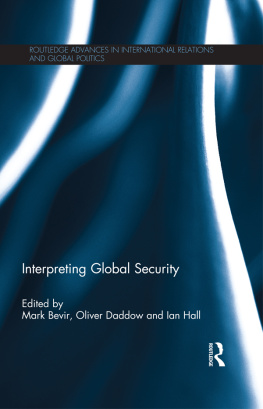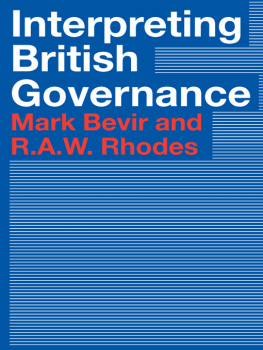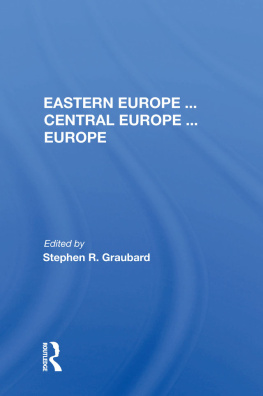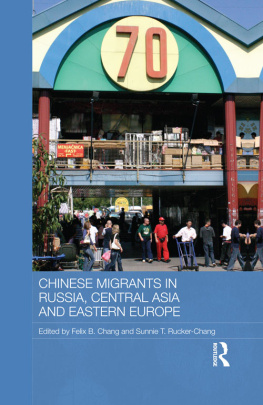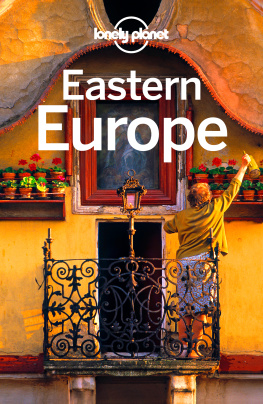edited by Mark D. Steinberg and Valeria Sobol. - Interpreting emotions in Russia and Eastern Europe
Here you can read online edited by Mark D. Steinberg and Valeria Sobol. - Interpreting emotions in Russia and Eastern Europe full text of the book (entire story) in english for free. Download pdf and epub, get meaning, cover and reviews about this ebook. City: DeKalb :, year: c2011., publisher: Northern Illinois University Press,, genre: Religion. Description of the work, (preface) as well as reviews are available. Best literature library LitArk.com created for fans of good reading and offers a wide selection of genres:
Romance novel
Science fiction
Adventure
Detective
Science
History
Home and family
Prose
Art
Politics
Computer
Non-fiction
Religion
Business
Children
Humor
Choose a favorite category and find really read worthwhile books. Enjoy immersion in the world of imagination, feel the emotions of the characters or learn something new for yourself, make an fascinating discovery.

- Book:Interpreting emotions in Russia and Eastern Europe
- Author:
- Publisher:Northern Illinois University Press,
- Genre:
- Year:c2011.
- City:DeKalb :
- Rating:3 / 5
- Favourites:Add to favourites
- Your mark:
- 60
- 1
- 2
- 3
- 4
- 5
Interpreting emotions in Russia and Eastern Europe: summary, description and annotation
We offer to read an annotation, description, summary or preface (depends on what the author of the book "Interpreting emotions in Russia and Eastern Europe" wrote himself). If you haven't found the necessary information about the book — write in the comments, we will try to find it.
Interpreting emotions in Russia and Eastern Europe — read online for free the complete book (whole text) full work
Below is the text of the book, divided by pages. System saving the place of the last page read, allows you to conveniently read the book "Interpreting emotions in Russia and Eastern Europe" online for free, without having to search again every time where you left off. Put a bookmark, and you can go to the page where you finished reading at any time.
Font size:
Interval:
Bookmark:
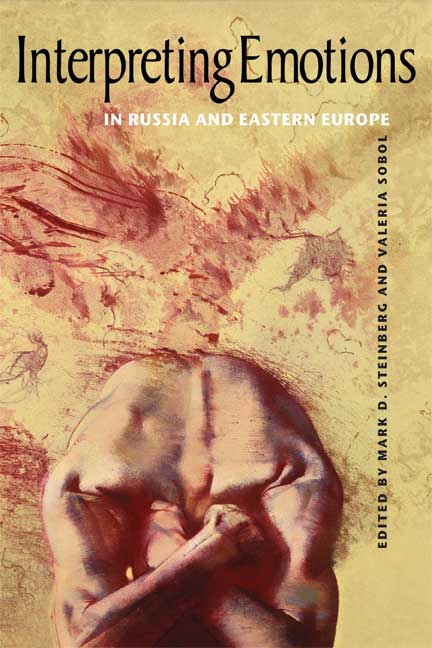
Interpreting Emotions in Russia and Eastern Europe
EDITED BY Mark D. Steinberg and Valeria Sobol
Northern Illinois University Press / DeKalb
2011 by Northern Illinois University Press
Published by the Northern Illinois University Press, DeKalb, Illinois 60115
Manufactured in the United States.
All Rights Reserved
Jacket design by Julia Fauci
Frontispiece is from the painting, Dusty Wind (2003, oil on canvas, 76 X 102 cm, private collection) by Zoya Frolova, generously contributed by the artist.
First digital edition, 2011.
Library of Congress Cataloging-in-Publication Data
Interpreting emotions in Russia and Eastern Europe / edited by Mark D. Steinberg and Valeria Sobol.
p. cm.
Papers from a conference held at University of Illinois, Urbana-Champaign,
in summer 2008.
Includes bibliographical references and index.
ISBN 978-0-87580-653-2 (clothbound : acid-free paper)
1. RussiaSocial life and customsCongresses. 2. Europe, EasternSocial life and customsCongresses. 3. RussiaPolitics and governmentCongresses. 4. Europe, EasternPolitics and governmentCongresses. 5. EmotionsSocial aspects
RussiaHistoryCongresses. 6. EmotionsSocial aspectsEurope, Eastern
HistoryCongresses. 7. EmotionsPolitical aspectsRussiaHistoryCongresses. 8. EmotionsPolitical aspectsEurope, EasternHistoryCongresses. 9. Social changeEurope, EasternHistoryCongresses. 10. Social changeEurope, EasternHistoryCongresses. I. Steinberg, Mark D., 1953- II. Sobol, Valeria.
DK32.I59 2011
152.40947dc22
2011000920
Contents
Acknowledgments
Mark D. Steinberg and Valeria Sobol
Introduction
Ilya Vinitsky
The Queen of Lofty Thoughts
The Cult of Melancholy in Russian Sentimentalism
Andrei Zorin
Leaving Your Family in 1797
Two Identities of Mikhail Muravev
Victoria Frede
Radicals and Feelings
The 1860s
Alexandra Oberlnder
Shame and Modern Subjectivities
The Rape of Elizaveta Cheremnova
Ronald Grigor Suny
Thinking About Feelings
Affective Dispositions and Emotional Ties in Imperial Russia and the Ottoman Empire
Glennys Young
Bolsheviks and Emotional Hermeneutics
The Great Purges, Bukharin, and the February-March Plenum of 1937
Polly Jones
Breaking the Silence
Iurii Bondarevs Quietness between the Sincerity and Civic Emotion of the Thaw
Judith Pintar
Emplaced and Displaced
Theorizing the Emotions of Space in the Former Yugoslavia
Jack R. Friedman
A Genealogy of Working-Class Anger
History, Emotions, and Political Economy in Romanias Jiu Valley
Carol Silverman
Music, Emotion, and the Other
Balkan Roma and the Negotiation of Exoticism
Serguei Alex. Oushakine
Emotional Blueprints
War Songs as an Affective Medium
Bibliography
Contributors
Index
Acknowledgments
This volume grew out of a conference organized by the editors in the summer of 2008 at the University of Illinois in Urbana-Champaign. Participants were selected from a large number of proposals, indicating the vitality of this still relatively new field of study. This conference could not have taken place without the financial and organizational support of the Russian, East European, and Eurasian Center, which hosted the meeting as its annual Ralph and Ruth Fisher Forum. We thank the director and especially the hardworking staff of REEEC. Other centers, programs, and departments at the University of Illinois provided essential funding for the conference, including the College of Liberal Arts and Sciences; the School of Literatures, Cultures, and Linguistics; the Center for Advanced Studies; International Programs and Studies; the European Union Center; the Unit for Criticism and Interpretive Theory; the Department of Slavic Languages and Literatures; the Department of History; and other units.
At Northern Illinois University Press, Amy Farrantos commitment to this project has been of great value. Also at the Press we thank Susan Bean, Julia Fauci, Sara Hoerdeman, and Candace McNulty. On behalf of the authors and ourselves, we are grateful to the referees chosen by the Press, Louise McReynolds and Peter Stearns, whose many critical insights advanced and helped to unify this work. The cover image was generously contributed by the artist Zoya Frolova. Jane Hedges did heroic work helping us reconcile style and formatting variations to ready the manuscript for the Press. We are thankful to Kirsten Painter for her meticulous work on this books index.
Above all, we thank the contributors. It has been a pleasure and an intellectual inspiration to work with them. As participants at the Fisher Forum, they intensely engaged one anothers work, often across quite expansive disciplinary, geographic, and chronological spaces. And they continued to do so during rounds of revisions. We also thank other participants at the conference, especially those whose papers did not find their way into the final volume. They too contributed much to the project as a whole. Not least, the editors are grateful to one another for intellectual partnership and a relative lack of panic or exasperation.
Introduction
MARK D. STEINBERG AND VALERIA SOBOL
Emotions have, in recent years, become the subject of a rising tide of study, interpretation, and theory. Since the late 1980s, conferences, articles, and books on this topic have proliferated, involving a very wide range of disciplines and eras and regions of the world. Many have spoken of a new affective turn or emotional turn in the humanities and social sciences, suggesting a change comparable to the linguistic turn of the 1970s, including in the extent of interdisciplinary reach and methodological impact. Scholars working on Russia, Eurasia, and eastern Europe have more recently begun to engage and contribute to the study of emotions, with a succession of workshops and conferences since 2003 and a few initial publications. As part of this growing attention to emotion as an object of study and a category of analysis, this volume brings together, in dialogue with one another and with scholars working on other regions, new work by some of the leading scholars in Slavic and east European studies engaged in emotion research and interpretation. Unlike the few other publications on emotions concerning this important region of Europes east, this book is unusually embracing in its reach across nations, across more than two centuries of time, and across disciplines and methodologies.
The problem of how to interpret emotions is not new, of course. Inquiries into the nature and workings of the passions, feelings, emotions, moods, dispositions, and affects (different writers prefer different terms and often distinguish their meanings) have a very long history, as does attention to particular emotions, such as love, melancholy, or anger. But recent work has taken new directions, reflecting important theoretical and methodological trends within and across disciplines. At times, the range of approaches is dizzying. Contemporary theories of cognition, the body, subjectivity, subjection, power, self, language, performativity, culture, society, gender, and memory, in varied combinations and interpretations, have been tied into the study of emotions. But most consistent and significant about approaches since the mid-1980s has been a newly critical perspective on the key epistemological question of how we know and interpret the world and how the people we study comprehend their lives. As Ronald Suny notes in his chapter, recent work has advanced well beyond both the vague and unfocused methodology in which emotions are viewed as so ubiquitous in human behavior that they explain nothing while being used to explain everything and the rigid and reductionist belief, which still has considerable weight in the social sciences, that all human action is based on rational calculation. Newer work, by contrastthough drawing on a tradition that, since at least Aristotle and, later, Descartes, Spinoza, and sensationalist philosophers, has stressed a deep interconnectedness between emotions and reasonviews reason and emotion as complexly intertwined with one another and with physiology, culture, and history. In other words, rather than seeing emotions as a separate, private, and visceral sphere that occasionally seethes over into the world of consciousness, it is precisely the inseparable interrelationships of thinking and feeling, the body and society, and private self and public self that demand our attention. These perspectives also lead to deep exploration of the mutual relationships between emotions and society, emotions and politics, and emotions and historical change. These newer approaches are strongly evident in this volume.
Font size:
Interval:
Bookmark:
Similar books «Interpreting emotions in Russia and Eastern Europe»
Look at similar books to Interpreting emotions in Russia and Eastern Europe. We have selected literature similar in name and meaning in the hope of providing readers with more options to find new, interesting, not yet read works.
Discussion, reviews of the book Interpreting emotions in Russia and Eastern Europe and just readers' own opinions. Leave your comments, write what you think about the work, its meaning or the main characters. Specify what exactly you liked and what you didn't like, and why you think so.

